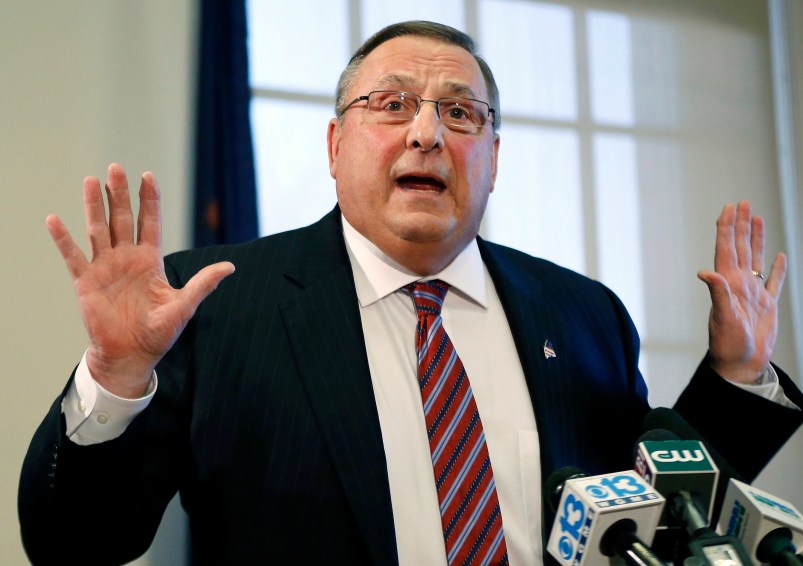Maine Gov. Paul LePage (R) released a notorious binder Monday morning that he claimed would prove “90-plus percent” of drug dealers in the state “are black and Hispanic people” from out of state. But the binder doesn’t actually appear to back that assertion up, according to the Portland Press Herald.
The released contents of the binder can be viewed on the Press Herald’s website. It does not include information on the race of those arrested for drug crimes, and only a fraction of the reports in the binder are accompanied by photographs, most of which are solitary mug shots.
The binder does contain scattered information on where those arrested for drug crimes came from — though available data does not support LePage’s claim that the vast majority are from Waterbury, Connecticut, and The Bronx and Brooklyn, New York.
Asked to comment on the discrepancy between the governor’s claims and data available in the binder, a spokeswoman, Adrienne Bennett, wrote in an email to TPM that “[t]his is about out-of-state accused drug traffickers.”
“I’ve been collecting every single drug dealer who has been arrested in our state,” LePage said in a town hall in late August. “I don’t ask them to come to Maine and sell their poison, but they come and I will tell you that 90-plus percent of those pictures in my book, and it’s a three-ringed binder, are black and Hispanic people from Waterbury, Connecticut, the Bronx and Brooklyn.”
“There are a whole lot of white girls, too, a whole lot of white girls,” LePage continued at the time. “In fact, in almost every single picture is a white Maine girl in the picture.”
The ACLU of Maine requested to see LePage’s binder after that comment, filing a request under Maine’s Freedom of Access Act. Executive director Alison Beyea said in response to LePage, “According to the governor, Maine police are nine times more likely to arrest people of color for selling drugs than white people, even though we know white people are just as likely to commit drug offenses. This alarming disparity in arrests raises significant concerns that Maine law enforcement is participating in unconstitutional racial profiling.”
LePage had previously made a similar claim about who’s dealing drugs in Maine in a January town meeting.
“These are guys with the name D-Money, Smoothie, Shifty – these types of guys – they come from Connecticut and New York, they come up here, they sell their heroin, they go back home,” he said. “Incidentally, half the time they impregnate a young white girl before they leave, which is a real sad thing because then we have another issue we have to deal with down the road.”
This post has been updated.







Is this guy still not impeached?
Noted for the record: Neither D-Money, nor Smoothie, nor Shifty were in the binder.
Paul LePage is full of sh#t. Who knew?
D-Money, Smoothie, Shifty are writers in the script department for Adam Sandler’s production company. In their spare time they make pop-up books depicting various historical characters farting, vomiting and shitting their pants while in a drunken stupor. George Washington with a black marker penis on his face is hilarious.
I guess it must not be against privacy laws to publish this if those listed were actually arrested, but I hope there will be lawsuits from those who were not convicted and/or innocent if it is not listed in the information released. LePage is a lunatic.